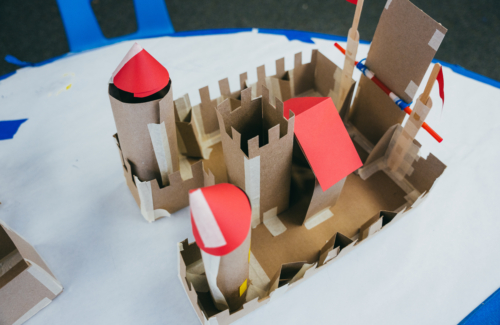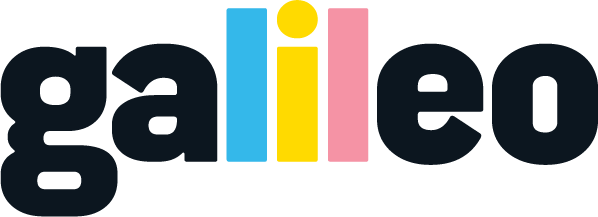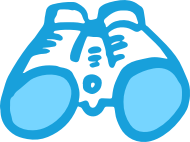The Best Summer Day Camps Foster an Innovators Mindset

Innovation powers our world. From the harnessing of fire to the creation of the wheel to sending rockets into space, innovation has and continues to lead to breakthroughs that change society in crucial ways. But you also don’t have to be a world leader or scientist to be an innovator. We can all be innovators in our own personal worlds by taking action to bring about meaningful change and fulfillment in our lives.
This is something that every parent wants for their child—even if they’re not looking for them to invent the next technological breakthrough or cure for disease. It may not even be something parents think of as a possible outcome of summer camp. But at Galileo, this is our mission! We want to help develop innovators who envision and create a better world, and our one-of-a-kind programs are carefully and thoughtfully designed to help do just that.
Defining an innovator
What is an innovator? An innovator is someone who sees themselves as an agent of change and not as a recipient of circumstance. An innovator has a vision for how things could be better. And an innovator has the skills and confidence to make that vision a reality (and does it!).
But how is innovation born? Does everyone have the capacity? And can it be cultivated?
Galileo summer camps were founded on the belief that the world needs innovators and that every human being is capable of becoming one. By providing a magical environment, inspiring curriculum and rich culture all aligned to this belief, Galileo camps nurture young innovators while maximizing fun. At Galileo, future innovators exercise their creative spirit and indulge their curiosity as they learn to make their visions reality.
Innovation and summer camp
 Young children are brimming with innovative potential, and as they progress through developmental stages, exposure to the best kinds of experiences can help build and deepen an innovator’s mindset. In the right environment and with the proper support, kids are capable of becoming thoughtful, prolific innovators.
Young children are brimming with innovative potential, and as they progress through developmental stages, exposure to the best kinds of experiences can help build and deepen an innovator’s mindset. In the right environment and with the proper support, kids are capable of becoming thoughtful, prolific innovators.
Since kids learn from everything around them, it is really important to place them in environments that support the outcomes we seek. The best learning settings are child-centered and meet kids where they are. And the best environments for innovation education offer a supportive culture where kids can freely share their creative thoughts, stretch themselves to try new things, celebrate mistakes for the lessons they provide and iterate on initial ideas to achieve their goals.
Galileo summer camps provide this and more. They put kids at the center of each experience, valuing each individual child for who they are so their best selves can emerge. And the programs are oriented around creating an environment that encourages curiosity, fosters creativity and compels children to see themselves not as recipients of circumstances but as actors and inventors in the world.
THE GOOD NEWS IS THAT NO MATTER WHERE WE ARE ON THE PATH TO BECOMING INNOVATORS, WE CAN ALWAYS BECOME MORE INNOVATIVE.
Galileo camps are built around the Galileo Innovation Approach® (GIA). The GIA is a three-part framework designed to nurture the innovative potential in each child. All innovators need 1) substantive knowledge that guides breakthrough thinking, 2) a mindset that promotes innovative work and 3) a process that supports bringing the best ideas to fruition.
The Innovator’s Mindset
Innovation starts with the way you think of yourself and the attitude with which you approach projects. The Galileo Innovator’s Mindset identifies 5 key characteristics required for innovation:
Be Visionary • Be Courageous • Be Collaborative • Be Determined • Be Reflective
I AM VISIONARY
On the world’s stage, when we think of a visionary, someone like engineer/inventor Elon Muskcomes to mind, whose large-scale goals include reversing global warming through the use of sustainable energy systems and perhaps even the colonization of Mars. On a slightly smaller stage, like that of your family home, being visionary begins with simple imagining, whether it’s building a fort to read in or creating a new dinnertime ritual to help family members connect more deeply each day.
Vision begins with simply imagining something that does not yet exist and then applying that new idea to make something better. From the time they are toddlers, kids are imaginative; what’s key is that they recognize the power of their ideas and their own power to bring ideas to fruition.
How we do it: At Galileo, we help kids give wings to their ideas. We design projects that go well beyond step-by-step models so that each child is compelled to create something that is both meaningful and original. We then teach specific strategies to support prolific idea generation and ask guiding questions that help kids flesh out their ideas until they are formed enough to begin building. With every imaginative theme and exciting major, campers learn that their ideas are valued and they are encouraged to exercise and develop their visionary mindset.
Why it matters: The visionary mindset kids take away from their camp experience will prompt thoughtful problem solving, critical thinking and creativity, the top three skills employers will be seeking by 2020. And these qualities won’t just aid campers with their future careers—individuals who can look at any situation not only for what it is, but what it might become, are empowered to live happier and more fulfilling lives and to more confidently tackle academic, personal and professional challenges.
I AM COURAGEOUS
Consider our namesake, Galileo Galilei, widely considered the Father of Modern Science. His support of a heliocentric view of the universe put him in direct opposition to the prevailing beliefs and powerful authorities of his time. His trial by the Inquisition highlights the conflict some visionaries have experienced as a result of their innovative ideas, and their persistence in standing by their ideas.
But you don’t need to risk house arrest to be courageous. In everyday life, being courageous can look like freely sharing your creative thoughts even if you think others may not agree or stretching yourself to try something new—a food, an activity, a challenge.
Innovators, who by definition are creating something new, must accept challenges and take risks. It takes courage to challenge the status quo and propose a truly unique idea. Stepping out of your comfort zone may seem hard at first, but with each courageous step, that zone gets bigger and bigger, and so does the potential for innovation.
How we do it: Galileo works hard to make camp a safe space for campers to fearlessly share their ideas. And since we celebrate mistakes for the learning opportunities they provide, campers are freed from worrying about being wrong and are empowered to take risks and try new things. Couple that with our thoughtful, project-based curriculum, and it’s easy to see how our summer camps help kids build confidence in themselves and in their ideas.
Why it matters: Embracing (rather than running away from) challenges supports learning and growth and is important in school, work and life. Careers of the future are sure to require consistently trying new things, learning new skills and viewing risks as opportunities to succeed. The courageous mindset will serve kids well in all of these ways, long after camp has ended.
I AM COLLABORATIVE
Many of the most newsworthy innovators utilize a collaborative mindset; think TED, GV and Ycombinator. The opportunity to engage with other innovators and share ideas can be empowering and motivating. As further evidence, think about the proliferation of collaboration platforms used in schools, in business and yes, at innovation summer camps.
But collaboration is far more than just “group work.” It involves having empathy to value the unique perspectives of others, build on the ideas of others and use one’s own strengths to support the work of our peers. Being collaborative in personal life might include being a good team player in sports or theater, practicing active listening in difficult conversations or successfully creating something (a cake, a costume, a garden) with others.
How we do it: An innovation day camp provides a powerful arena for developing the interpersonal and communication skills necessary for collaborative teamwork. With a collective purpose, Galileo campers practice group dynamics that give them the skills to work together to define problems and accept input from their peers. Through collaboration, they magnify their problem-solving power and recognize how collaboration gives them more, and often better, ideas than they would have come up with on their own.
Why it matters: Commitment to a collaborative mindset will benefit kids in family, team and school interactions. The ability to communicate and willingness to collaborate are key to maintaining healthy relationships and successful partnerships. These qualities are also highly valued in the workplace.
I AM DETERMINED
George Washington Carver and Thomas Edison were determined innovators whose prolific careers sparked many inventions. Carver developed new and diversified crops, teaching former slaves to support themselves with innovative agricultural practices. With over 1,000 patents to his credit, Edison typified innovative determination when he said, “I have not failed. I’ve just found 10,000 ways that won’t work.”
Being determined is important for reaching any goal: mastering a new song on the violin, perfecting a pass in soccer or a new dance routine, creating a poem or finishing a weekly homework packet. Whatever the goal, it’s important for kids to recognize that innovation and mastery require effort and that it is ongoing practice and perseverance that moves us all along the path from where we are today to where we’d like to be.
How we do it: Galileo builds children’s capacity for determination by creating engaging projects with developmentally appropriate goals that children are unlikely to reach on their first try. This sets an expectation that perseverance will be required to succeed. Couple this with a supportive culture that calls mistakes “marvelous” and gives kids strategies to stick to it, our camper’s determination skills grow. And don’t just take our word for it. In a multi-year independent project, a team from Stanford’s Graduate School of Education has been studying how Galileo camps impact campers’ mindsets and have found that kids who participate in Galileo’s curriculum respond better in the face of failure and tend to persevere at harder, novel design tasks.
Why it matters: We live in a world where instant gratification is readily available on so many fronts, yet many things we most aspire to don’t come easily. Being determined is critical to meeting personal and professional goals. And each time we persevere and succeed, we bolster our self-confidence and grow the resilience needed to take on the next level challenge.
I AM REFLECTIVE
Reflective innovators know how to use feedback and introspection about what is and isn’t working in a design or team in order to make improvements. Take, for example, Google CEO Larry Page, who has described his early days at Google as often involving heated arguments with Google co-founder Sergey Brin. Eventually, he implemented a “zero tolerance for fighting” policy at the company after coming to understand that it was unproductive and divisive. Instead, he worked to foster an atmosphere of greater collaboration, respect and unity throughout the company.
But you don’t have to be a CEO to practice being reflective. Being reflective in daily life means stopping to think about how something went (a performance, an athletic event, a school project) and considering what is and isn’t working and how to make improvements. It means asking for feedback. As kids learn and grow, they become more capable of reflecting on their experiences and can better apply what they’ve learned to new ideas and concepts. This knowledge gives them the ability to keep formulating new hypotheses and then test, revise and retest them.
How we do it: By practicing the Galileo Innovator’s Process at camp, reflection will be “all in a day’s work” for kids, as they learn the importance of looking back, celebrating what worked, acknowledging what didn’t and getting to know themselves better.
Why it matters: Developing a habit of reflection helps us to process information, refine our ideas and learn from our experiences. Whether we debrief aloud with our team or reflect independently in a journal or blog, we take the time to consolidate our thoughts and construct our understanding. This helps us prepare for next time. Thinking about what is and isn’t working and seeking feedback to improve yourself and your work is an important skill whether you are trying to improve performance in sports, academics or even your personal life.
Adopting an innovator’s mindset
Throughout human history, the desire for a better life has spurred innovative thinking. Whether to solve a personal problem or to impact the common good, innovators, young and old, have made extraordinary gains in every aspect of life.
As an innovation summer camp, Galileo can have a remarkable effect on kids. By awakening and nurturing kids’ to be Visionary, Courageous, Determined, Collaborative and Reflective. Galileo staff strive to help kids develop valuable and long-lasting life skills. In a 5-day camp week, kids become actively involved and practice sharing their ideas. The resilience gained by persevering through adversity will give them new perspective. Kids will walk in the shadows of innovators who came before them and leave camp with the knowledge that they, too, can impact change. They will look at the world and their own work with an innovator’s mindset, and truly believe that they can make things better. If your kid is ready to start innovating, enroll for camp or join our mailing list to get all of our latest news and information.

